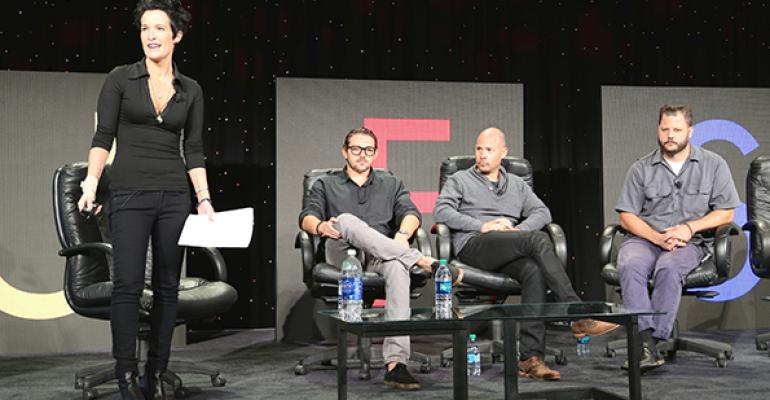With Millennials putting more emphasis on choosing to work for and spend their money at businesses that have a sense of greater purpose, social responsibility matters.
So said three restaurant operators who shared their stories at the recent MUFSO Conference in Dallas last month, including Irvine, Calif.-based Wienerschnitzel, Los Angeles-based Tender Greens and Dallas-based Café Momentum.
Amanda Hite, CEO and chief change officer of Be The Change Revolutions, who moderated the panel, urged restaurant operators to consider their brand legacies.
Watch the full panel discussion below:
“For better or worse, your great great grandchildren will be able to Google you and read about what kind of legacy you and your business might leave,” she said.
Hite made the case that “giving a damn” and doing good with your restaurant brand can be an important part of the sustainability of a business.
Recent polls indicate that 79 percent of Millennial consumers say a sense of purpose impacts where they choose to work, and 82 percent say it influences where they spend their money on goods or services. Another 55 percent say they would pay more for products and services they believe contributes to positive change.
Doing good with your business also has a significant impact on the way consumers speak about your brand on social media, Hite added.
“It’s important to tell those stories and talk about it, but it’s also important that team members are so proud of what you’re doing that they’re talking about it too,” she said.
On the panel, J.R. Galardi, chief visionary officer of Wienerschnitzel and son of founder John Galardi, shared the story of his company’s Hotdogs for Homeless program, a 30-day tour that raised $200,000 toward feeding those in need.
Wienerschnitzel worked with high school groups in 30 cities, teaching students how to raise money and give away hot dogs and socks to people living on the streets.
More importantly, the tour resulted in the creation of 30 Hotdogs for Homeless chapters at schools that have carried on the work, Galardi said.
“It’s all about empowering youths to give back in the community,” he said. “The goal is to create a ripple effect. We show up to a city and feed homeless people for a day — that’s great. But if we get out and teach kids how easy it is to do it, [it continues.]”
Erik Oberholtzer, co-founder of 22-unit Tender Greens, created a program called the Sustainable Life Project that helps at-risk youths coming out of foster care to develop new skills in a structured culinary and farming program.
“We wanted to get involved in a meaningful way to break cycles of poverty in this country, rather than just treat symptoms,” Oberholtzer said.
Partnering with community groups, Tender Greens hires kids to work in the chain’s restaurants. They start in the dish pit, where they first prove they can handle some of the toughest work, as well as basics like showing up on time and learning how to be a member of a team.
From there, they move on to prep areas of the kitchen. They eventually work in the front of the house, and they also have an opportunity to visit the chain’s partner farms to learn about food and diet — a key element for kids who may have never seen a chicken except in nugget form, he said.
These are kids who would not likely make it through the interview process at a typical job, but Tender Greens gives them those skills and more. Many end up staying with the chain full time after they “graduate,” Oberholtzer said.
Return on investments
Chad Houser created the restaurant Café Momentum to offer life and social skills and employment to at-risk youths that might otherwise be on a path to jail.
As chef and executive director, Houser said he designed the restaurant to address their needs in a holistic way with a 12-month internship that teaches basic skills, working through the various restaurant stations, and helping them learn how to run a business.
Jail recidivism rates are about 47 percent in Dallas, Houser said. But the 160 youths that have gone through the Café Momentum program over three years have a jail return rate of only 11 percent, which Houser estimates has saved Dallas taxpayers about $8 million, or $130 million, if you consider the cost of those kids moving in and out of jail over the course of a lifetime.
“Think about all the lives that could change, all the good that could be done in this community, with that money,” he said.
Houser said the restaurant is the first exposure to the idea of family for many of the youths. One calls Houser “grandma” because his grandmother was the only person the young man could count on in his life.
“Somebody’s got to believe in them,” Houser said of his team. “It might as well be me.”
All three operators said the return on their investments with such programs was multifaceted.
Galardi said the Hotdogs for Homeless Tour received more than 85 million media impressions, all unpaid, and sales spiked in each market they visited with the program.
“You can’t even quantify the social impressions, with hashtags and people taking their pictures on the tour, and word of mouth alone had a large, large, large impact,” he said. “We developed an aura and a cult following behind us. It was an impact I couldn’t have anticipated.”
Oberholtzer said the Sustainable Life Project has helped with recruiting. “It’s the No. 1 thing people mention when they come in to interview,” he said.
Houser said the biggest benefit was knowing how his investment was saving taxpayers money.
“It was a proud moment to say to the mayor, ‘You owe me a check for $8 million,’” he said.
Contact Lisa Jennings at [email protected].
Follow her on Twitter: @livetodineout





